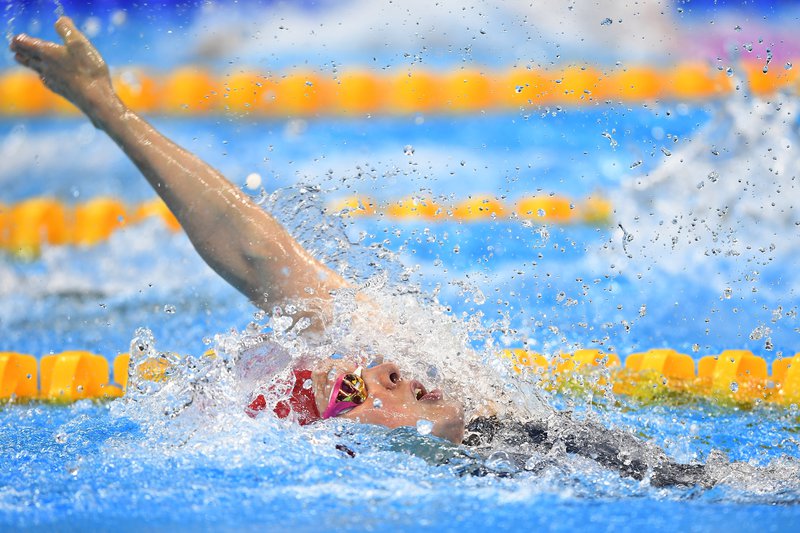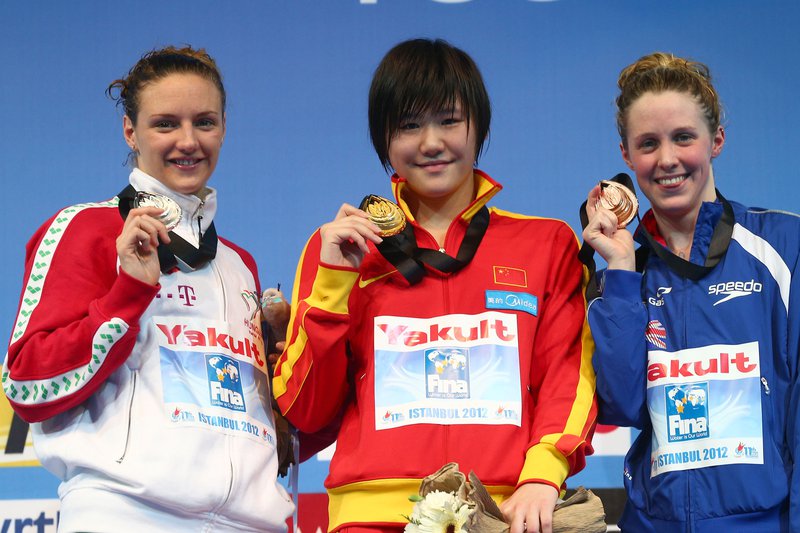When Hannah Miley became one of 50 elite athletes to come together as part of The Well HQ's #SayPeriod campaign back in October, the three-time Olympian knew the campaign's name was simple but very effective.
"If you think about it, there are so many different euphemisms around saying the word 'period' - I think there are something like 5,000 - and how often do individuals feel comfortable saying the word? But it's just being on your period," says the World Championship medallist, who has become a vocal ambassador in the bid to normalise conversations around periods in sport and is doing so again on International Women's Day 2023.
Miley continues: "I think the more conversations we can have about it, the more comfortable we get saying the word period ourselves and the more we can start breaking down that initial barrier.
"Because it is an uncomfortable topic a lot of people feel very sensitive towards it - it's private, it's personal. However it is important not to feel on your own with it - whether you're the athlete experiencing periods, the parent of an athlete, or even a coach. The more we can start normalising that type of language, the easier communication will be and it helps spread support as well.
"Communication is the key to everything, right? If we can talk about it - an athlete who might be struggling with their period, or the parent, coach, staff member struggling to know how to help - that hopefully will open up better relationships to have healthy conversations and communication. We need to see more research being done to better understand female physiology and to also protect the health of the individual who is menstruating.
"Ultimately the key is making sure individuals can remain happy and healthy in their sport, whatever level they take it to."
Hannah's 'level' in swimming saw her reach five Olympic finals across three Games, as well as become European champion and stand on a World Championship podium in 2011.

A host of other medallists at Olympic, world and European level were among those to pledge their support for the #SayPeriod campaign last year, with the hope that conversations and representation at the elite level could ultimately see a far-reaching impact made across all tiers of sport and society.
That is an important starting stroke, according to Hannah - but the 33-year-old is also keen to see a focus given to the intrinsic value of periods, as well as the positive stories around high-performance sportswomen managing their periods during and around their achievements on the field of play.
"It's so important for the elite side of sport to normalise talking about this. The funny thing is that when I was doing some of my research, there are articles interviewing tennis player Heather Watson, dating back to 2015, calling periods the last taboo in sport - and yet here we are, eight years on, still calling it that," she adds.
"It's almost like it becomes sensationalised once every year or two. A lot of the stories that are told mainly highlight the negative impacts and disruptions that being on your period in elite sport can have.
"Everybody's experience is very different, so I'm not taking away that experience - but there are many ways that can help manage and make it work to the athlete’s advantage. Paula Radcliffe broke a world record while on her period!
"For me personally, if I turned up to an Olympic final and found out I had just started my period, I can't exactly go, 'well that's me, I'm going to go home!' You want to be able to perform regardless.
"It's really good to have role models speak out about it, to show that it’s not all doom and gloom and something to stress or worry about. There are some advantages to being on your period, it's important to highlight those. Working with your body’s menstrual cycle has proven to be beneficial for not just performance but overall health.
"I've been on a massive journey myself, learning about how to listen and understand my body. It's trying to bring it to the point where, yes, sometimes cycles can be inconvenient, yes there are certain stories and embarrassing moments - but there are so many positive things that I used to overlook that I now celebrate.
"I like to view it as your body's way of giving you a report card, a health check to show how your body is doing for that cycle. A regular period is like a regular heartbeat, it's important to have. Having regular periods is important, during teenage years it is normal for some irregularity whilst the body is going through puberty. By the age of 16/17 it should have settled out. Management strategies and finding ways to support the body and learning to know what your normal is allows you to find that balance.
"Activity and sport can be really beneficial for easing menstrual cramps. Certain nutrient intakes can also help support the body through the different phases of the cycle, allowing for better recovery, and better energy levels so you can remain active.
"We're not going to change the mindset and the culture of that overnight, but hopefully getting the messaging out there, the more research that can be done around it is hugely fascinating."
The volume of research into the impact of periods on performance is increasing. Hannah - whose time on senior British Swimming squads lasted for close to 15 years - saw a big development in her time in elite swimming, although she remains among the athletes calling for that growth in research to continue further.
"It's certainly getting a lot better. You have examples like Chelsea FC, where the women's team work with Fitrwoman & Orreco (a World Class Bio-Analytics company for sport) where they map and track each athlete’s cycle and create personalised management strategies to benefit training plans for the athletes," she says.
"It helps give the coaches a helping hand too. No athlete is the same and each athlete’s menstrual experience will be slightly different. Individual strategies for each athlete in partnership with their coaches being made allows for more effective training plans.
"More research needs to be done, to help maximise potential with menstruation. This can future proof the health and wellbeing for many female athletes. Certainly from when I started swimming many years ago the information and support was just not there, currently it is a lot better - but it still needs to keep growing. This is not just for elite athletes, but for anyone taking part in sport.
“Everyone, at some point in their lives, will either work with or know someone who menstruates, so a basic understanding of what goes on and not the spoken ‘myths’ can help spread better positive message around menstruation.
"It is all about those marginal details at that elite level. Energy, performance gains, and mindset as well - there are so many intricate details within it, and working with your cycle is so, so key."
In her bid to further the conversation and knowledge sharing around periods and period management in sport and businesses at all levels, Hannah has been delivering online and in-person period workshops under her new brand, Typically 28, along with Scottish Swimming, the most recent of which she hosted last month.
Through this, the individual medley specialist has developed her own learning, consulting experts and carrying out research of her own to ensure she can help the next generation of athletes, both in and out of the water.
"From what I'd learned, I realised that I need to protect my health a lot more, and there's still things I can do. It was a really personal journey in a sense, learning more about my body - I came off the pill, I mapped and tracked how my body was responding to actually having a natural regular period, because I'd spent 15 years where I technically didn't have a period as I was on the pill I didn’t know what a regular period was for me," she explains.
"I learned a lot and feel proud to have gone from a young teenager with very irregular and painful periods, being put on the pill to “fix the problem” coming off the pill and now understanding, helping my body to be regular, managing and be healthy. I felt all this information I’ve used needed to be shared. I'm not an expert, I'm not somebody with PhDs behind them, but there are individuals who I've worked with whose research and data I want to pass on, because we need to shout about it, we need to get this out there!
"So I created the online workshops to basically share the information and share the passion that I have for this, and actually being like, 'how cool is this?!' When you're on your period, your cognitive function, so learning a new skill is so, so good. Nobody knows about that. So it's little things like that. Giving the empowerment back to those listening.
"It's all well and good saying, 'look at this!' and then people are like, 'great, now what do I do with it?' So it's hopefully translating this research and info into something that is functional, so people can actually take action upon it. Or even just the simple thing of learning how to track when you ovulate, tracking when you start certain symptoms.
"One of my strongest symptoms I know before I start my period is I become incredibly clumsy! I have what I call 'dropsy', where doing the dishes, I'm just a liability because I end up fumbling things. It's not intentional, but my hand-eye coordination goes out the window.
"Were I still competing, as a swimmer, I would have then made sure that I was super careful when it came to land-based exercises or anything like that at that time, because that was probably my highest chance of injuring myself in that little window. Again, just that awareness is so key.
"The conversations hopefully allow the individual to take ownership of their body, become friends with it and get to know it a little bit more so that they can better ready, so ultimately, whatever decision they choose for their career in sport or elsewhere, they are empowered enough to keep themselves healthy and to take it to whatever level they want to.
"Every athlete who gets into the pool may have the dream of being an Olympic swimmer, but some athletes don't, and that's fine as well - but they should still be able to walk away from the sport feeling healthy, happy and as well, transfer from what they've learned from this into the world outside sport."

